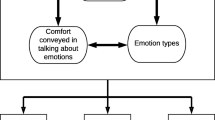Abstract
This research employs multiple methods in a multi level investigation of the ways in which emotions afford interactions and participation in a science class and an associated cogenerative dialogue (cogen). A teacher researcher identified a vignette involving an altercation he had with a student in which anger and frustration mediated what happened.
Access this chapter
Tax calculation will be finalised at checkout
Purchases are for personal use only
Preview
Unable to display preview. Download preview PDF.
Similar content being viewed by others
References
Anderson, E. (1999). Code of the street: Decency, violence, and the moral life of the inner city. New York, NY: W.W. Norton.
Appiah, K. A. (2006). Cosmopolitanism: Ethics in a world of strangers. New York, NY: W. W. Norton & Co.
Ben-Ze’ev, A. (2000). The subtlety of emotion. Cambridge, MA: The MIT Press.
Collins, R. (2004). Interaction ritual chains. NJ: Princeton University Press.
Education Week. (2007). Diplomas count 2007: Ready for what? Preparing students for college, careers, and life after high school. Bethesda, MD: Editorial Projects in Education Research Center.
Erickson, F. (1986). Qualitative methods in research on teaching. In M. C. Wittrock (Eds.), Handbook of research on teaching (pp. 119–161). New York, NY: Macmillan
Guba, E., & Lincoln, Y. S. (1989). Fourth generation evaluation. Newbury Park, CA: Sage Publications.
Harrigan, J., Rosenthal, R., & Scherer, K. R. (Eds.). (2005). The new handbook of methods in nonverbal behavior research. Oxford: Oxford University Press.
Have, P. T. (2007). Doing conversation analysis: A practical guide (2nd ed.). London, UK: Sage.
Houten, W. D. T. (2007). A general theory of emotions and social life. New York, NY: Routledge.
Izard, C. E., & Ackerman, B. P. (2000). Motivational, organizational, and regulatory functions in discrete emotions. In M. L. Lewis & J. Haviland-Jones (Eds.), Handbook of emotions (2nd ed., pp. 253–264). New York, NY: Guilford.
LaFollete, H. (1996). Personal relationships: Love, identity, and morality. Oxford, UK: Blackwell.
Lemke, J. L. (1990). Talking science: Language, learning and values. Norwood, NJ: Ablex.
Neild, R. C., Balfanz, R., & Herzog, L. (2007). An early warning system. Educational Leadership, 65(2), 28–33.
Roth, W.-M., & Lee, Y. J. (2007). Vygotsky’s neglected legacy: Cultural-historical activity theory. Review of Educational Research, 77, 186–232.
Roth, W.-M., & Tobin, K. (2010). Solidarity and conflict: Prosody as a transactional resource in intra-and intercultural communication involving power differences. Cultural Studies of Science Education. doi:10.1007/s11422-009-9203-8
Sewell, W. H. Jr. (2005). Logics of history: Social theory and social transformation. Chicago, IL: University of Chicago Press.
Sutton, R. (1991). Maintaining norms about expressed emotions: The case of bill collectors. Administrative Science Quarterly, 36, 245–268.
Tangney J. P., Hill-Barlow D., Wagner P. E., Marschall D. E., Borenstein J. K., Sanftner J., Mohr T., & Gramzow R. (1996). Assessing individual differences in constructive versus destructive responses to anger across the lifespan. Journal of Personality and Social Psychology, 70, 780–796.
Tiedens, L. Z. (2001). Anger and advancement versus sadness and subjugation: The effect of negative emotion expressions on social status conferral. Journal of Personality and Social Psychology, 80, 86–94.
Tobin, K., & Llena, R. (2010). Producing and maintaining culturally adaptive teaching and learning of science in urban schools. In C. Murphy & K. Scantlebury, (Eds). Moving forward and broadening perspectives: Coteaching in international contexts (pp. 79–104). Dordrecht: Springer.
Turner, J. H. (2002). Face to face: toward a sociological theory of interpersonal behavior. Palo Alto: Stanford University Press.
Editor information
Editors and Affiliations
Rights and permissions
Copyright information
© 2014 Sense Publishers
About this chapter
Cite this chapter
Tobin, K., Llena, R. (2014). Emotions as Mediators of Science Education in an Urban High School. In: Tobin, K., Shady, A. (eds) Transforming Urban Education. Bold Visions in Educational Research. SensePublishers, Rotterdam. https://doi.org/10.1007/978-94-6209-563-2_13
Download citation
DOI: https://doi.org/10.1007/978-94-6209-563-2_13
Publisher Name: SensePublishers, Rotterdam
Online ISBN: 978-94-6209-563-2
eBook Packages: Humanities, Social Sciences and LawEducation (R0)




